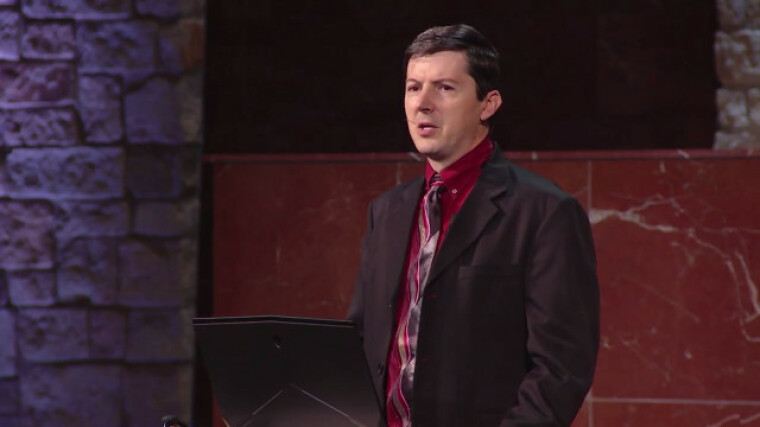Creationist discovers new planet using data from Kepler spacecraft

A Christian astrophysicist in Texas has discovered a new planet seven times bigger than Earth while analyzing data from the Kepler spacecraft.
Dr. Jason Lisle, the director of physical sciences at the Dallas-based Institute for Creation Research, announced the discovery in May after he analyzed a measurable drop in the brightness of the host star KPLR 7826659, during a period in which the planet crossed in front of the star.
"The way it works is a planet will occasionally cross directly in front of its star as seen from Earth, and that causes a slight drop in the star's brightness because the planet is essentially casting its shadow on the Earth," Lisle told Christian News Network.
"Kepler can measure that drop in brightness, and that tells us the size of the planet relative to its star," he continued.
The Kepler spacecraft, launched in 2009 for the purpose of researching stars and exoplanets in the Milky Way, records the brightness of 145,000 stars using a photometer and transmits the data back to Earth.
Lisle explained that thousands of planets have been discovered orbiting stars by analyzing the data from the spacecraft.
KPLR 7826659 had already been marked as a "potential candidate" in the Kepler archives, but nothing has been published to confirm that there is a planet orbiting the celestial body.
"That's what made this one very exciting for me as I'm apparently the first to confirm that there is a real planet orbiting that star," Lisle stated.
The astrophysicist noted that the discovery was fascinating because secular scientists do not expect large planets to orbit in close proximity to its host star.
Lisle noted that the newly discovered planet is almost as large as Jupiter, and yet, it orbits quite close to its star, which he says runs "contrary to secular expectations, but perfectly consistent with the diversity that the Lord has built into His universe."
The astrophysicist further explained that the current technology only allows the discovery of planets that happen to cross directly in front of its star. He said that it is presumed that many other stellar systems are tilted relative to our solar system, so the planets remain undetected because they never cross in front of their host star.
Lisle, who is one of the few astrophysicists that believe on the authority of the Bible, graduated summa cum laude from Ohio Wesleyan University where he double-majored in physics and astronomy, and minored in mathematics. He was also instrumental in developing popular planetarium shows at the Creation Museum in Kentucky.
 Christians don't have to affirm transgenderism, but they can’t express that view at work: tribunal
Christians don't have to affirm transgenderism, but they can’t express that view at work: tribunal Archaeology discovery: Medieval Christian prayer beads found on Holy Island
Archaeology discovery: Medieval Christian prayer beads found on Holy Island Presbyterian Church in America votes to leave National Association of Evangelicals
Presbyterian Church in America votes to leave National Association of Evangelicals Over 50 killed in 'vile and satanic' attack at Nigerian church on Pentecost Sunday
Over 50 killed in 'vile and satanic' attack at Nigerian church on Pentecost Sunday Ukrainian Orthodox Church severs ties with Moscow over Patriarch Kirill's support for Putin's war
Ukrainian Orthodox Church severs ties with Moscow over Patriarch Kirill's support for Putin's war Islamic State kills 20 Nigerian Christians as revenge for US airstrike
Islamic State kills 20 Nigerian Christians as revenge for US airstrike Man who served 33 years in prison for murder leads inmates to Christ
Man who served 33 years in prison for murder leads inmates to Christ


 Nigerian student beaten to death, body burned over ‘blasphemous’ WhatsApp message
Nigerian student beaten to death, body burned over ‘blasphemous’ WhatsApp message 'A new low': World reacts after Hong Kong arrests 90-year-old Cardinal Joseph Zen
'A new low': World reacts after Hong Kong arrests 90-year-old Cardinal Joseph Zen Iran sentences Christian man to 10 years in prison for hosting house church worship gathering
Iran sentences Christian man to 10 years in prison for hosting house church worship gathering French Guyana: Pastor shot dead, church set on fire after meeting delegation of Evangelicals
French Guyana: Pastor shot dead, church set on fire after meeting delegation of Evangelicals ‘Talking Jesus’ report finds only 6% of UK adults identify as practicing Christians
‘Talking Jesus’ report finds only 6% of UK adults identify as practicing Christians Mission Eurasia ministry center blown up in Ukraine, hundreds of Bibles destroyed: 'God will provide'
Mission Eurasia ministry center blown up in Ukraine, hundreds of Bibles destroyed: 'God will provide' Church holds service for first time after ISIS desecrated it 8 years ago
Church holds service for first time after ISIS desecrated it 8 years ago Burger King apologizes for 'offensive campaign' using Jesus' words at the Last Supper
Burger King apologizes for 'offensive campaign' using Jesus' words at the Last Supper Uganda: Muslims abduct teacher, burn him inside mosque for praying in Christ’s name
Uganda: Muslims abduct teacher, burn him inside mosque for praying in Christ’s name